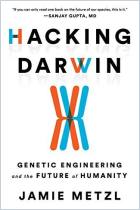Únase a getAbstract para acceder al resumen.

Únase a getAbstract para acceder al resumen.
Kevin Laland
Evolution Unleashed
Is evolutionary science due for a major overhaul – or is talk of “revolution” misguided?
Aeon, 2018
¿De qué se trata?
Epigenetics claims that decisions made during your lifetime can affect your children’s genes.
Recommendation
The next generation does not inherit the changes that happen during their parents’ lives. Or do they? A new area of research, epigenetics, challenges the idea that life experiences do not influence offspring. While a body builder does not give birth to a muscular baby, the exercise might influence the baby’s genes. Evolutionary biologist Kevin Laland explores new epigenetics research and scientists’ response. This article will engage anyone interested in the “evolution revolution,” and how decisions in the present can change lives in the future.
Summary
About the Author
Kevin Laland is a professor of behavioral and evolutionary biology at the University of St. Andrews in Scotland and leads the extended evolutionary synthesis research program.
















Comment on this summary